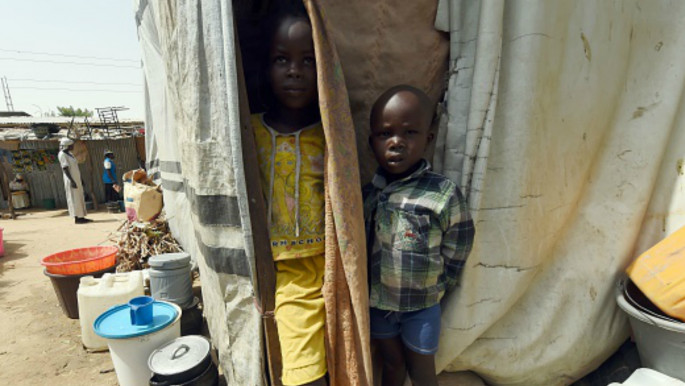Where are our girls? Remembering Nigeria's abducted schoolgirls
Locals are angry and frustrated the teenagers have not been found, but remain somewhat optimistic, after a new video was released leading to hopes of their safe return.
"Bring back our girls now and alive" proclaimed a banner carried by protesters marching in the capital of Abuja, using the phrase that made the captives a worldwide cause after their kidnap from school in the northeastern town of Chibok.
Boko Haram militants stormed and firebombed the Government Girls Secondary School on April 14, and seized 276 girls who were preparing for exams. Dozens escaped within hours, but 219 remain missing.
The United Nations warned on Thursday that such kidnappings have become common across Nigeria's conflict ridden communities, with up to 7,000 girls or women living in abduction.
"Humanitarian agencies are concerned that two years have passed and still the fate of the Chibok girls and the many, many other abductees is unknown," Fatma Samoura, UN's humanitarian coordinator for Nigeria said.
The abducted girls and women are forced into marriage, sexual slavery and rape, and some had even been used to carry bombs, the UN reports.
| Nigerians marked Thursday's painful second anniversary of the mass abduction of the Chibok girls [AFP] |
Boko Haram has killed and kidnapped thousands in a campaign of violence in recent years as the militant group seeks to establish an Islamic caliphate in Africa's most populous country of 170 million people that is divided almost equally between mostly Christians in the south and Muslims in the north.
Chibok girls not forgotten
It was the mass kidnap in Chibok that grabbed the world's attention.
Since then, the inability of Nigeria's government and military to rescue them has led, in part, to the electoral defeat of President Goodluck Jonathan.
A social media campaign using the hashtag #BringBackOurGirls reached to the White House, where US first lady Michelle Obama tweeted in May 2014: "Our prayers are with the missing Nigerian girls and their families. It's time to #BringBackOurGirls."
While much of the world has moved on, the girls are not forgotten in Nigeria, where there marches took place on Thursday in major cities.
 |
While much of the world has moved on, the girls are not forgotten in Nigeria, where marches took place in major cities |  |
Hundreds chanted "We want them back!" as they demonstrated in Abuja.
"[The president] understands the torment, frustration and anxiety of the parents, and will not spare any effort to ensure the safe return of the girls," said a statement issued by the office of Nigerian president Muhammadu Buhari on Thursday.
| Hundreds chanted "We want them back!" as they demonstrated in Abuja [Getty] |
In Chibok, some parents of the girls joined Vice President Yemi Osinbajo, Borno, state governor Kashim Shettima and other officials at the burned-out school to pray for the safe return of the victims.
Glimmer of hope
Nigeria's government on Thursday said it was studying a "proof of life" video showing 15 of the schoolgirls abducted by Boko Haram.
The footage is the first time any of the missing girls have been seen since a previous Boko Haram video in May 2014, when about 100 were seen in Islamic dress reciting the Quran.
Three mothers and a classmate of the 219 schoolgirls still missing confirmed the identities of the girls in the images.
Borno state governor Kashim Shettima, on a visit to Chibok, said: "The video... is of the Chibok girls. It's good news."
 |
The footage is the first time any of the missing girls have been seen since a previous Boko Haram video in May 2014 |  |
A senior government source told AFP it had received the video, which shows the girls in black hijabs, stating their names, that they were abducted from Chibok and saying they were "all well".
 |
| Children have been robbed of their right to education by attacks on schools, Human Rights Watch said [AFP] |
The video was said to have been shot on December 25 last year.
But the source said they were keen to avoid the problems encountered by the previous administration, which prematurely announced talks with Boko Haram elements and even a ceasefire.
"Our intelligence and security authorities... received a similar video in July last year and when they followed the lead it led to a cul-de sac," he revealed.
Contact could not be made and it was impossible to determine the identities of the purported Boko Haram members who sent it or if the move had the blessing of the group's leadership, he added.
An opportunity to address wider crises
Amnesty International called on Thursday for the release of all captives and said the Chibok girls symbolised "all the civilians whose lives have been devastated by Boko Haram."
Meanwhile, the International Crisis Group said the anniversary was an opportunity to address the conflict's effect on children as the military frees more areas from Boko Haram's control.
Human Rights Watch said this week some 952,000 of the 2.6 million people displaced by the violence were children, who had been "robbed" of their right to education by attacks on schools.
Agencies contributed to this report





 Follow the Middle East's top stories in English at The New Arab on Google News
Follow the Middle East's top stories in English at The New Arab on Google News


